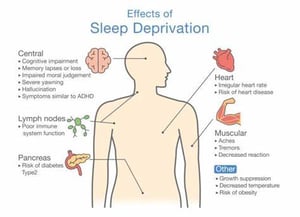Narcolepsy is a sleep disorder characterized by a frequent and uncontrollable desire for sleep. This can result in sudden sleep at any time and place, regardless of what's happening. This results in the distortion of normal sleep patterns and rhythms causing excessive daytime sleepiness and a dangerous amount of sleep deprivation.
Irregular sleeping patterns are not only inconvenient, they can have medical, emotional, and psychological consequences. Continue reading to learn more about Narcolepsy.
What are the Two Types of Narcolepsy?
There are two types of Narcolepsy, Type 1 and Type 2. The difference between both types of narcolepsy is whether or not cataplexy is present.
Cataplexy is an episode in which strong emotion causes a sudden loss of muscle tone, causing our bodies to go limp. Cataplexy can lead to a lack of muscle tone in an isolated body part, such as a slack jaw, or can impact the whole body, causing an inability to stand upright.
Type 1 Narcolepsy includes cataplexy while Type 2 does not. Around 75% of Narcoleptics have Type 1.
What are the symptoms of Narcolepsy?
-
Excessive daytime sleepiness
-
Cataplexy
-
Sleep paralysis, which is a temporary inability to move or sleep after waking
-
Hallucinations, which are temporary, vivid, dream-like visions or delusions
-
Disrupted nighttime sleep
What Causes Narcolepsy?
Narcolepsy is caused by the loss of a brain chemical called hypocretin. This chemical is a neurotransmitter that is involved in the regulation of the sleep-wake cycle. Without its presence, the body is unable to regulate sleep adequately.
While it is not understood exactly what causes the loss of hypocretin, there is evidence that a combination of genetic and environmental factors can contribute to the development of narcolepsy.
Researchers have also identified a gene that is linked to narcolepsy, which occurs in about one-quarter of the U.S. population.
Facts about Narcolepsy?
Fortunately, narcolepsy does not affect many people –
-
It is relatively rare, affecting about 1 in every 2000 people
-
It is estimated that only 25% of people with narcolepsy have received a formal diagnosis
-
Symptoms generally begin to appear in people between the ages of 10-30
-
Average time to diagnosis after onset of symptoms is about 7 years
What are the Risks of Narcolepsy?
The symptoms of narcolepsy can cause dangerous situations considering the impact it has on brain function and attention. There are increased safety concerns for narcoleptics because of the increase in dangerous situations such as car accidents from sudden onset of sleep or sleep deprivation. Aside from problems caused by the random onset of sleep, sleep deprivation has complications such as:
- Lower life expectancy
- Sleep deprivation linked to heart disease and stroke [source]
- Decreased immune function (in one study, people who received less than 7 hours of sleep were three times more likely to develop a cold than those with 8 hours or more of sleep)
- Strong link of sleep deprivation to weight gain
- Lower glucose metabolism and Type 2 diabetes risk [source]
- Link to increased inflammation [source] (those with IBS or other bowel disorders may have already noticed a relationship between your intestinal health and sleep)
Can Narcolepsy be Treated?
A Narcolepsy diagnosis requires a sleep study, and although it is incurable, this sleep disorder can be treated with medications and lifestyle adjustments.
If you find yourself experiencing many of the symptoms in this article, please click below to take a free sleep test to determine your next plan of action!


